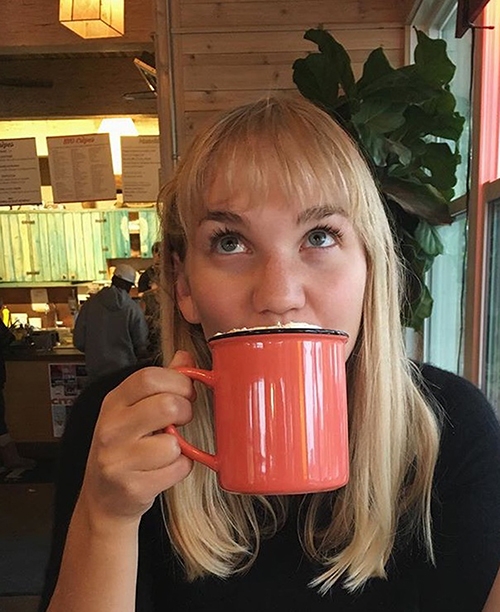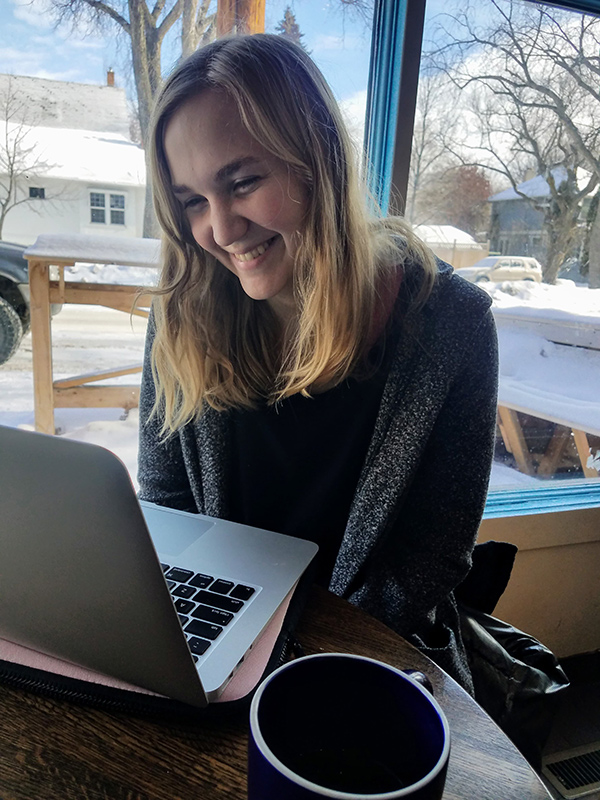Exposed: An Interview with Sarah Ens
“It’s possible that I hoped when my hair was ripped away so too would be my sense of shame. My disappointment, always, in what my body is or isn’t.”
Sarah Ens, “Entangled”
TNQ’s 2019 Edna Staebler Personal Essay Contest winner is Saskatchewan-based writer Sarah Ens, for her provocative essay, “Entangled.”
You can read the essay here, or in our fall 2019 contest issue, TNQ 152.
TNQ’s annual Personal Essay contest has no word count and all submissions are considered for publication. The 2019 adjudicators were Lamees Al Ethari, Pamela Mulloy, Emily Urquhart, and yours truly.
–Susan Scott
TNQ Contributing Editor
“An hour and a half before I leave my apartment to get all of the pubic hair ripped out of my body, I wonder if I am making a mistake.” So opens “Entangled.” What follows is a series of candid considerations about this “iconic feminine experience,” laced with troubling personal memories and scenes at your aesthetician’s that turn on submission and doubt. Let’s just say that the contest judges found your approach unsettling and enchanting. We wanted to know more about the writing process. How did this piece come together? What’s the life story of the essay?
The story of this essay truthfully does begin with that first sentence, with me sitting at my kitchen table, looking at the waxing appointment on the calendar, and wondering what on earth I was doing. I started writing down the troubling and contradictory feelings I was having as a way to make sense of them. Then during the waxing, I mentally made notes so I could sort it all out later. My thinking was, well, if I can make a story out of this, maybe it will have been somewhat worth it.
Back home after the appointment, I scribbled a sort of stream-of-consciousness account and was surprised by how vulnerable, even violated, I felt. I think that’s why the essay’s tone is so candid. The writing was coming from a profoundly exposed moment.
It was only a few days later, when I decided to take what I’d written and turn it into an essay I could submit to my (extraordinarily supportive) MFA nonfiction workshop, that I decided to braid the present-tense narrative of the actual waxing with reflective passages that examine the external pressures that drive people, particularly women, to do things like get all the pubic hair ripped from their bodies.
It was this research and reflection that helped to clarify my own internalized feelings about my body hair/body.
Public/pubic—one letter separates these words, and in its addition (or deletion) lies a world of difference. You use the word “exposed,” which begs the question: why tell such an intimate story in the first place? And why an essay, rather than poetry or fiction?
This question about what should be publicly written about and what should be kept private is something I struggle with a lot.
I tend towards confessional writing and I’m drawn to poetry and prose that says things that “shouldn’t” be said. I’m learning, though, that just because an experience is important or makes a good story, that doesn’t mean I have an obligation to share it.
For this piece, humour helped me feel more comfortable discussing personal details. Humour can function as a shield against too much exposure. That’s also where the form of the essay, as opposed to a poem or a story, came in. The personal essay allowed me to pull in other voices as historical and sociological information on body hair, and that research made me feel validated in my oversharing.
I mean, getting waxed is a strange and invasive activity—it only felt right to write about it from a first-person, nonfiction, “stripped back” perspective.
Plus, as I say in the essay, I’ve had so many conversations with women about waxing! I thought: if this many women get waxed regularly, it really should be something we talk about more publicly.
Are you a fan of certain essayists? Did you take any works as models as you wrote this piece?
Yes! I love essayists who reveal the strange, tender human-ness within what we usually skim over as mundane or ordinary. The anthology GUSH: Menstrual Manifestos of Our Times edited by Rosanna Deerchild, Ariel Gordon, and Tanis MacDonald contains a number of essays that are really good examples of this. I also admire the essays of Roxane Gay, Joan Didion, Thomas King, Samantha Irby, David Sedaris, Lee Maracle, Rebecca Solnit, Scaachi Koul, Cheryl Strayed … many!
 You wrote “Entangled” while a student at the University of Saskatchewan’s MFA program. Tell us how you came to writing. What attracts you to creative nonfiction (CNF)?
You wrote “Entangled” while a student at the University of Saskatchewan’s MFA program. Tell us how you came to writing. What attracts you to creative nonfiction (CNF)?
I will be graduating this fall from USask’s excellent MFA program. I’ve been super lucky to learn from Jeanette Lynes and Sheri Benning and their expertise in CNF.
I always knew I wanted to write. It was the only thing I for sure wanted to do. In Grade 12, I googled “creative writing programs Canada” and discovered UBC’s undergraduate program. Getting accepted to their BFA was a huge thrill, and made me feel like pursuing writing was something I could do.
I was mostly interested in writing poetry when I began my undergrad, but then I took my first creative nonfiction classes with Deborah Campbell and Andreas Schroeder and completely fell in love with the form. I remember reading Tom Junod’s profile of Fred Rogers, “Can You Say …Hero?” for Deborah Campbell’s class and being struck by the potency of combining factual information with metaphor.
I also grew up devouring my dad’s Rolling Stone magazines. I especially loved profiles with musicians, and the ways the writers scaffolded each interview. How do you tell something “truthfully” but in the most captivating way possible?
Submitting to literary contests can be time-consuming and expensive. Congratulations on taking the risk! What attracted you to the Edna Staebler Personal Essay Contest?
Thank you! At some point in my career as an emerging writer I decided that if I had a piece I believed in, I would submit it, regardless of how much of a long-shot it might be.
I’ve admired TNQ for a long time and always take note of its contest winners. When the Edna Staebler contest popped up on my Facebook, “Entangled” had just been workshopped by my peers. They’d received it positively, so I thought, I guess I’ll send my weirdo Brazilian wax piece to TNQ!
Although it’s an expense, I think it’s worth it to keep an eye out for contests that publish interesting work and to invest in one’s writing career by submitting. Worst case scenario, you’ll have a polished piece and (usually) a magazine subscription.
Of course, I didn’t really consider the risk of winning, then having to call my parents to say, “I won a contest about me getting a Brazilian wax!”
“Entangled” has been circulating for a while; has your relationship with it changed, now that others have clapped eyes on it? I’m interested in the feedback you’ve gotten and in the enduring power of a work—not only how it resonates with readers but its impact on the writer. Are you still exploring push-pull messages around beauty and the female form? Or have you said all you’ve got to say—for now?
I have a feeling I’ll be exploring my relationship with shame my whole life.
I saw on Twitter the other day this excerpt of a 2009 Vanity Fair profile of Jessica Simpson. The writer calls Simpson “fat” multiple times and defines the whole story around her body. Stories like that were everywhere when I was growing up, and sometimes that negative messaging directed towards women and our bodies still feels inescapable.
I have to work every day at undoing the body shame I’ve internalized. As long as I’m doing that work, I’ll be writing about it.
There is also something powerful in talking about what makes you feel ashamed. It flips the shame into something shared, something manageable.
That said, I might take a break from writing explicitly about my own body! I was nervous when the essay began circulating—and extremely nervous when I read the first few paragraphs of the essay at the Wild Writers Festival this past November. I would never tell someone I’d never met about my Brazilian wax—not face-to-face I wouldn’t. But there’s something about the page that enables courage, or maybe confession.
The response to the essay, from my aunties to acquaintances, has been overwhelmingly positive. I feel emboldened by that.
Edna Staebler—the contest’s namesake—was a pioneering writer in our region whose nonfiction attracted national attention. Thanks to her generous bequest, TNQ can offer the winner a $1,000 purse. Edna was a champion of emerging writers. It was her hope—as it is ours—that prize money would encourage emerging writers to embrace the writing life. What about you, Sarah? Has this win been affirming?
The win has been life-changing, truly. And not just because $1,000 makes a big difference to a graduate student!
When you’re an emerging writer, you’re always hoping someone else will get what you’re doing. For people to get my essay on this scale is absolutely affirming—it’s like saying, regardless of the dark days and the writer’s block, I am on the right track.
 Sarah Ens is a writer and editor living in Treaty 6 territory. Her debut poetry collection, The World Is Mostly Sky, is forthcoming (April 2020) with Turnstone Press.
Sarah Ens is a writer and editor living in Treaty 6 territory. Her debut poetry collection, The World Is Mostly Sky, is forthcoming (April 2020) with Turnstone Press.
Photographs courtesy of Karla Froese, Lynette Ens, and Laura McAlduff, respectively.

